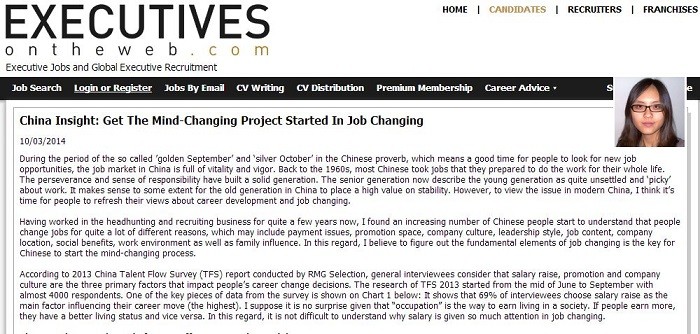According to the China Talent-Flow Survey Report conducted from January to March in 2013 by RMG Selection, it is shown that amongst over 2000 respondents, the proportion of job hopping reached 32% in 2012. The proportion of people who increased their demand to change their jobs in 2013 reaches up to 43%. I have to say that the number makes me think of employee retention again, which is quite a bothersome topic to many other companies too. So what can we do to keep them?
Firstly, I have to clarify that keeping staff members does not equate to keeping everybody. A low turnover rate does not mean that the company is performing well in keeping staff members. In this regard, it can be explained by the Pareto Law that only 20% of people create 80% the value of a company. Therefore, we should only keep those valuable employees. By improving the professional durability of the valuable and enhancing the mobility of the invaluable, a company can stay healthy and dynamic. According to research conducted by RMG Selection among over 200 long-term clients, the recommended turnover rate of the 20% core staff members is only 4%.
In general, the strategy of keeping staff members should be considered both psychologically and materially. Recently, people have been paying more attention to psychological measures. However, the material measure which plays an important role is somehow neglected. Although the incentive of salary increases merely last for less than half a year, the material strategy is still the base due to its existence and rationality instead of its quantity. In this regard, even if you pay more attention to the psychological needs of your staff members, without proper pay raises it is still difficult to ask them to stay.
Most companies have a salary raise system, but it might not be easy to decide the range. Actually, the range of pay raise reflects, to a large extent, the recognition towards the staff members in the year or in the recent period. Specific assessment and step construction can provide great satisfaction for excellent staff members. Therefore, high pay raises should be issued for the excellent employees, while the unqualified ones should not be rewarded in this case. The amount of salary increase needs to refer to the expectations of employees in job hopping.
According to the China Talent-Flow Survey Report, the pay raise expectations are listed below.
- 34% employees expect around 20% to 30% salary increase
- 28% employees expect around 30% to 50% salary increase
- Only 17% employees expect 10% salary increase
Excluding the cost consumed in changing jobs, companies may offer a 30% salary increase for those who rank among the top 5% in the performance appraisal based on their own financial conditions. Following a step-decreasing trend, the 5% at the bottom should be considered to be knocked out.
Additionally, diversified material incentives- including annual bonus, training, traveling, and transportation, communication and house subsidies have become the primary choice of many companies. It is worth mentioning that by taking some humanized steps one can get twice the result with half the effort. Take RMG Selection as an instance; more than 50% of the workforce is female. Last year, one of the female employees was hurt accidentally in a fight on the subway. The human resource department immediately suggested that any female staff members who wanted to practice self-defense should be able to learn it in a sparring club nearby. What is more, half of the cost should be borne by the company. In this case, whether the employee attended the club or not, the influence was quite positive.
As for the psychological measures, an environment where employees can grow up very fast should be created so that they would like to stay in the company willingly. In order to create such an environment, a company should make it clear to every employee about its expectations in the first place. To be specific, the employee should be clear about the expectation of the company, how to achieve the expectation, as well as what kind of results should be gained. Moreover, once employees meet the expectation, they know that they will be rewarded. In this regard, every employee will reduce the time of doing unnecessary work in such an environment and system. Employees will look forward to a bright future. Additionally, a manager should respect his or her employees by using proper language and behaviour. It is not really difficult to make it if you viewpoints are from two aspects. Firstly, encouragement towards small progress should be enhanced. Secondly, before you want to start a conversation or take actions with your employees you should think about whether your words or behaviour would discourage them. Over time, employees can feel the positive recognition from the company and the leader. Last but not the least, besides the number of conversations specified between the line manager and the employee, cross-level communication channels, especially private meetings should be added so that the communication process becomes so much easier. The human resource department should bear part of the responsibility to communicate with employees. Regular conversations with employees should be arranged, which develops the single-line communication channel to a multi-line tridimensional system.
As this is a vast country, more attention is paid to the cross-regional employees’ retention issue in China. Not only do more and more companies develop branch offices in different cities, but the job hopping choices of people are not limited. According to the China Talent-Flow Survey Report, over 70% of people would like to work in other cities if there are good opportunities. Among them, the proportion of males is 10% higher than that of the females. The data is actually good news for nonlocal recruitment, which is also the basis of keeping employees in different cities. Even for those aged around 31 and 40, who are often regarded as the most family-oriented people, 5% of them could work in other cities. According to our research, the reason why some talents would resign is that they hope to return to their hometown or they would like to work in cities like Beijing, Shanghai and Guangzhou. If the human resource department is able to effectively develop the potential of current staff members, not only could the talent-loss be saved, shortage of manpower in new offices can be solved as well.
Here’s good example could learn something from:
United Technologies Corp (UTC) is one of the largest manufacturing companies all over the globe. In July 2012, the acquisition of Goodrich by UTC was finalized; Goodrich and Hamilton Sundstrand got combined to form UTC Aerospace Systems, a world leader offering integrated technologies and systems for the aerospace and defense industries with more than 40,000 employees around the world. According to Cindy, human resource manager of UTC Aerospace Systems in Tianjin, an internal recruitment net is designed and developed by the human resource department. Internal employees can apply for jobs in different cities or subsidiaries or even abroad positions inside UTC. This system meets the needs of those employees who hope to develop in other regions. The application also will not be noticed by the people who are not from the human resource department. Only when the recruitment is accepted, will the notice be sent to the line manager. In this way, the enthusiasm of the employee can be guaranteed.
Employee retention is a long-lasting and extensive issue. On the premise of the guaranteed fairness, different measures should be developed towards different classes, regions and functions by the human resource department. For instance, it is indicated in the report from RMG Selection that last year the flow rate gap amongst different functional departments reached 30%. The highest one was government affairs (55%), while the lowest belonged to the IT industry (18%). Therefore, by improving and practicing constantly we can keep those valuable employees.

 An interesting point I noticed in this report is about the job changing situation with women: Decades ago, Chinese women were not allowed or not appreciated to work outside. The fast development in the society allows Chinese women to touch the outside environment. It can be seen in Chart 2 and Chart 3 the top 3 factors affecting job changing decisions are exactly the same in male and female. Furthermore, the data are basically at the same level. From taking the role of housewives to getting prepared to be female elites, Chinese women seems adjust themselves very well in career development.
Chart 2 Job changing factors in male
An interesting point I noticed in this report is about the job changing situation with women: Decades ago, Chinese women were not allowed or not appreciated to work outside. The fast development in the society allows Chinese women to touch the outside environment. It can be seen in Chart 2 and Chart 3 the top 3 factors affecting job changing decisions are exactly the same in male and female. Furthermore, the data are basically at the same level. From taking the role of housewives to getting prepared to be female elites, Chinese women seems adjust themselves very well in career development.
Chart 2 Job changing factors in male
 Chart 3 Job changing factors in female
Chart 3 Job changing factors in female
 During the past years of my staying in this culturally diverse country, I have heard quite a lot of interesting stories and history about China and Chinese culture. A very important example of this can be seen in chart 4 – “Promotion”, which is closely related with the deep rooted Chinese cultural importance placed on promotion and advancement. According to the famous Chinese ancient encyclopedia Lu Shi Chun Qiu, every single employee wants to get promoted in the hierarchical system. It is regarded as a fundamental need for people’s self-actualization. Back to the modern society, getting promotion is regarded as the recognition of employees’ hard-working and achievements.
Chart 4 Influence of promotion in job changing by age groups
During the past years of my staying in this culturally diverse country, I have heard quite a lot of interesting stories and history about China and Chinese culture. A very important example of this can be seen in chart 4 – “Promotion”, which is closely related with the deep rooted Chinese cultural importance placed on promotion and advancement. According to the famous Chinese ancient encyclopedia Lu Shi Chun Qiu, every single employee wants to get promoted in the hierarchical system. It is regarded as a fundamental need for people’s self-actualization. Back to the modern society, getting promotion is regarded as the recognition of employees’ hard-working and achievements.
Chart 4 Influence of promotion in job changing by age groups
 Though promotion ranks the second reason for people who are looking for new job opportunities, the need to be promoted varies in different age groups. Taking a look at the line graph (Chart 4) about promotion in different age groups, the influence of promotion is increasing from age of 18 to 35. People who are 30 to 35 years old are at the stage of golden career. Once they are at the position that they are satisfied, the need and want of changing jobs to simply get promotion becomes less strong. Comparatively, people at the younger age group might move on with their career because of a good promotion space in the new company.
The third element on the Chart 1 is really of great importance. Half of interviewees ‘hop’ to other companies simply because they like the company culture. Things like company values, working environment, collegial relationships, and core leaders matter to a large extent. The reason why it (company culture etc) matters is that in fact attracting talent is only the first step, and in fact perhaps the more important question is how to retain talent in a company. According to my experience in recruitment, more than 90% of the typical leaving reasons are actually related to his or her line manager or the management style of the company. However, lots of companies have never paid any attention on company culture building. Company culture equals the ‘smart power’ of the company. The influence of this ‘smart power’ is well penetrated in the operation process, which can be brought to not only clients as well as job seekers but employees as well.
Having contributed to many job interviews, I have quite a few interviewees telling me that they leave their current company simply because of the terrible working atmosphere, poor colleague relationship and punishing system which all belong to part of the company culture building. Money is an important element when people considering changing jobs, but I suppose nowadays people start to care about more than that. To create a unique corporate culture is extremely important for the competing enterprise. As an essential part of corporate culture, the branding of the employer not only enhances the sale-value, also able to attract talent for the enterprise
The last one on the list of Chart 1 is opinions from families. To be honest, I dare not agree with the argument that families don’t play a part in the job change decision making process. In the traditional Chinese culture, actually family is a very influential factor when people consider something very important. To show you this clearly, I would like to illustrate family opinion with a case of headhunters. Headhunters sometimes need to deal with cases of relocation. At this moment, opinions from family members can represent the decision-making power. Relocation might involve the moving of the whole family, which indeed need agreement from every family member.
Though promotion ranks the second reason for people who are looking for new job opportunities, the need to be promoted varies in different age groups. Taking a look at the line graph (Chart 4) about promotion in different age groups, the influence of promotion is increasing from age of 18 to 35. People who are 30 to 35 years old are at the stage of golden career. Once they are at the position that they are satisfied, the need and want of changing jobs to simply get promotion becomes less strong. Comparatively, people at the younger age group might move on with their career because of a good promotion space in the new company.
The third element on the Chart 1 is really of great importance. Half of interviewees ‘hop’ to other companies simply because they like the company culture. Things like company values, working environment, collegial relationships, and core leaders matter to a large extent. The reason why it (company culture etc) matters is that in fact attracting talent is only the first step, and in fact perhaps the more important question is how to retain talent in a company. According to my experience in recruitment, more than 90% of the typical leaving reasons are actually related to his or her line manager or the management style of the company. However, lots of companies have never paid any attention on company culture building. Company culture equals the ‘smart power’ of the company. The influence of this ‘smart power’ is well penetrated in the operation process, which can be brought to not only clients as well as job seekers but employees as well.
Having contributed to many job interviews, I have quite a few interviewees telling me that they leave their current company simply because of the terrible working atmosphere, poor colleague relationship and punishing system which all belong to part of the company culture building. Money is an important element when people considering changing jobs, but I suppose nowadays people start to care about more than that. To create a unique corporate culture is extremely important for the competing enterprise. As an essential part of corporate culture, the branding of the employer not only enhances the sale-value, also able to attract talent for the enterprise
The last one on the list of Chart 1 is opinions from families. To be honest, I dare not agree with the argument that families don’t play a part in the job change decision making process. In the traditional Chinese culture, actually family is a very influential factor when people consider something very important. To show you this clearly, I would like to illustrate family opinion with a case of headhunters. Headhunters sometimes need to deal with cases of relocation. At this moment, opinions from family members can represent the decision-making power. Relocation might involve the moving of the whole family, which indeed need agreement from every family member.






